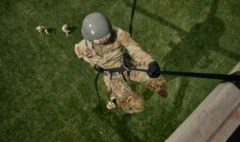Beyond the Battlefield: Why Language Skills are Crucial for Military Personnel
Beyond the Battlefield: Why Language Skills are Crucial for Military Personnel
In today’s interconnected world, the role of military personnel extends far beyond traditional combat scenarios. From humanitarian aid missions to peacekeeping operations, and from intelligence gathering to fostering international partnerships, the modern military operates in incredibly diverse and nuanced environments. And in this dynamic landscape, one skill often overlooked but absolutely critical is language proficiency.
You might think, “I’m in the military, not a diplomat!” But the truth is, being able to communicate effectively in a foreign language offers an unparalleled advantage for military personnel at every level. Here’s why learning a new language is not just an asset, but a vital tool for success in the armed forces:
1. Enhancing Situational Awareness and Intelligence: Imagine being on a patrol in a foreign land. Understanding local conversations, reading street signs, or even just picking up on subtle cues in a market can provide invaluable intelligence that could literally save lives. Language skills offer a direct window into the local populace’s sentiments, intentions, and understanding of the situation, allowing for more informed decision-making and better risk assessment.
2. Building Trust and Rapport: Effective communication is the cornerstone of any successful relationship. When you can speak the local language, even a few phrases, you immediately break down barriers and build trust with the local population. This is crucial for gaining cooperation, gathering information, and ensuring the success of any mission, whether it’s delivering aid or conducting joint exercises. It shows respect for their culture and demonstrates a genuine desire to connect, fostering goodwill that can be invaluable in volatile regions.
3. Improving Force Protection and De-escalation: Misunderstandings can escalate quickly in high-pressure situations. Being able to clearly communicate instructions, ask questions, or even offer reassurances in the local language can prevent misunderstandings that could lead to dangerous confrontations. Language skills are a powerful tool for de-escalation, allowing personnel to navigate tense situations with greater control and reduce the risk of hostile encounters.
4. Expanding Career Opportunities and Specialization: The military actively seeks individuals with diverse skill sets, and language proficiency is a highly sought-after attribute. From becoming a Foreign Area Officer (FAO) to working in intelligence, diplomacy, or special operations, strong language skills can open up a wide array of specialized roles and accelerate your career progression. These roles often involve significant travel and responsibility, offering unique and rewarding experiences.
5. Fostering Cultural Understanding and Adaptability: Learning a language isn’t just about memorizing vocabulary; it’s about immersing yourself in a new culture. This process inherently broadens your perspective, enhances your cultural understanding, and makes you more adaptable to different environments. This cultural intelligence is vital for operating effectively in diverse settings and for navigating the complex social dynamics of foreign nations.
6. Personal Growth and Cognitive Benefits: Beyond the direct military applications, learning a new language offers significant personal benefits. It enhances cognitive function, improves problem-solving skills, and boosts memory. It also provides a sense of accomplishment and opens up new avenues for personal enrichment and travel.
In conclusion, for military personnel, language learning is no longer a niche skill for a select few. It is a fundamental component of modern military readiness and effectiveness. By investing in language training, you are not only enhancing your own capabilities but also contributing significantly to the success and safety of your unit and mission. So, whether you’re deploying soon or just looking to broaden your horizons, consider picking up a new language – it’s an investment that will pay dividends both on and off the battlefield.





